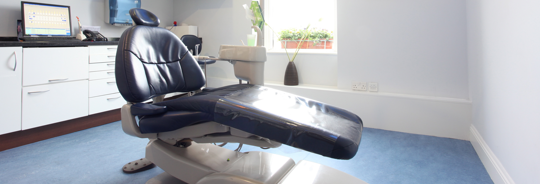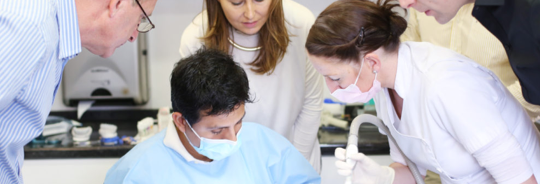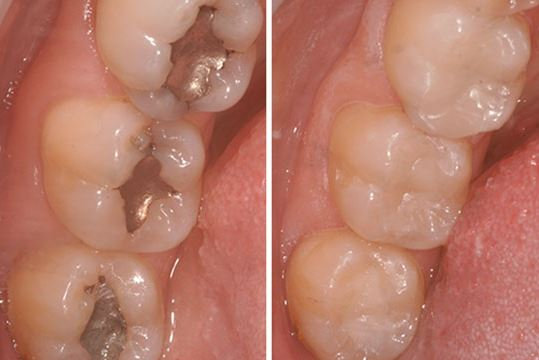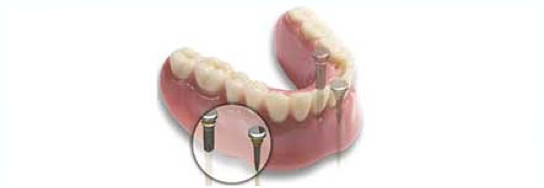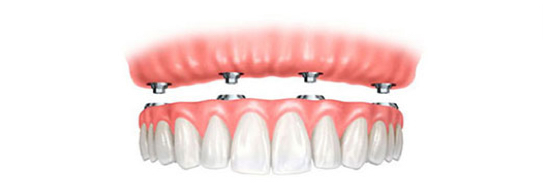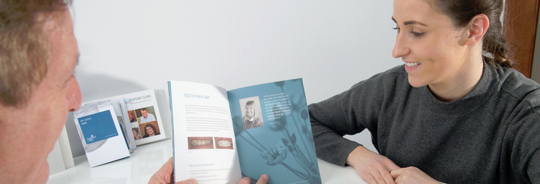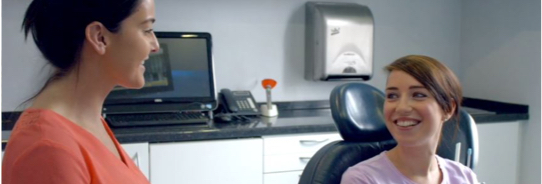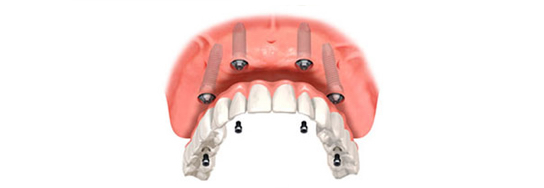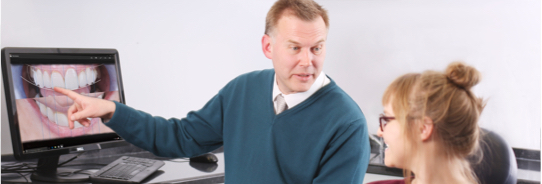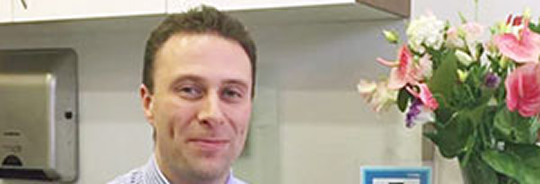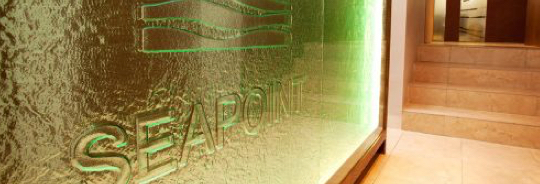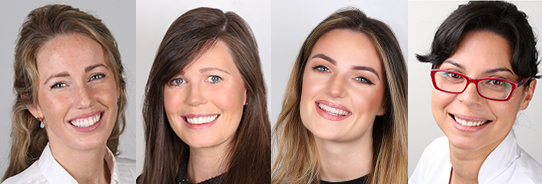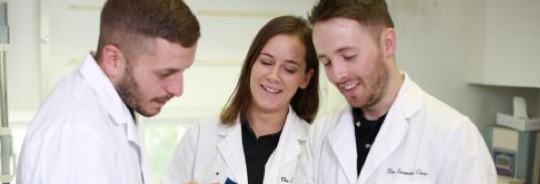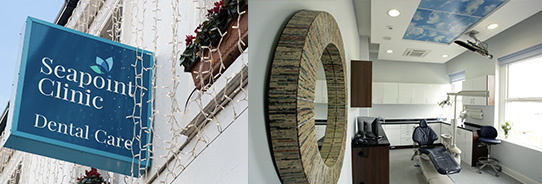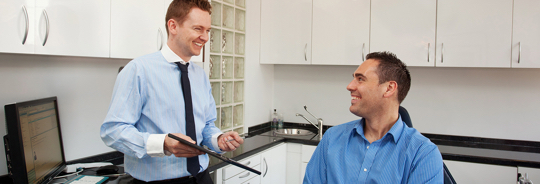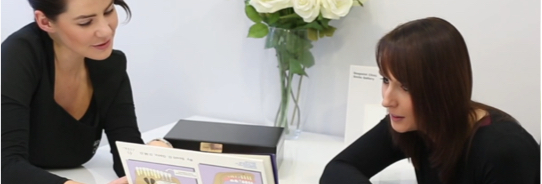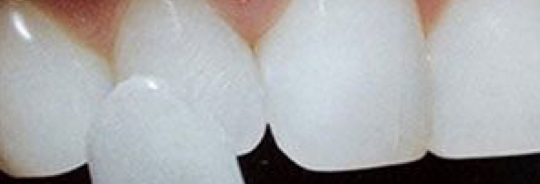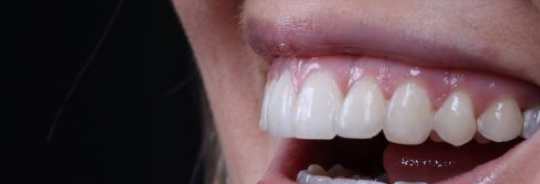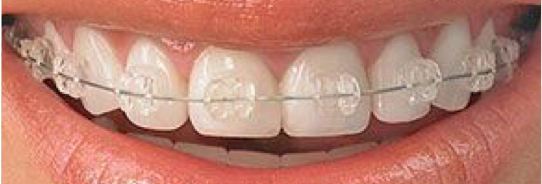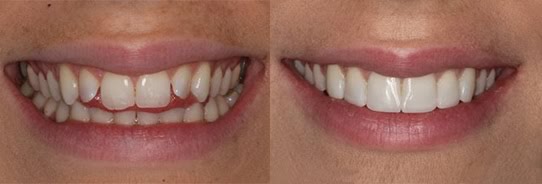Advantages of Full Mouth Dental Implants
- Improved appearance: Dental implants look and feel like your own teeth.
- Improved comfort: Because they become part of you implants eliminate the discomfort of removable dentures.
- Easier eating: Ill-fitting dentures can make chewing difficult. Fixed dental implants function like your own teeth, allowing you to eat your favorite foods with confidence.
- Improved self-esteem: Dental implants can give you back your smile and new lease of life.
- Reduced Bulk- Full dentures usually cover the palate in your mouth causing taste of food to change.
- No gagging- When the palate of a denture is covered or a denture moves it can cause uncomfortable gagging.
- Improved oral health: Dental implants don't require reducing other teeth, as a tooth-supported bridge does. Because nearby teeth are not altered to support the implant, more of your own teeth are left intact, improving long-term oral health. Individual implants also allow easier access between teeth, improving oral hygiene.
- Durability: Implants are very durable and with proper care can last a lifetime.
- Convenience: Removable dentures are just that; removable. Dental implants eliminate the embarrassing inconvenience of removing dentures, as well as the need for messy adhesives to keep them in place.
Disadvantages
- Procedure- Small surgical procedure required. Typically this can be carried out with some sedation so you don't remember it.
- Adaption- It takes time to adapt sometimes to smaller teeth when a denture has been worn for a long time
- Time- It will generally take between 6-12 months to finish (Although Teeth in a Day can accelerate this)
- Cost- The investment in your smile is more than with dentures but patients tell us the comfort and life changing benefits are more than worth it.
Full Mouth or Full Jaw Implants
This procedure usually involves placing 4 to 6 implants per jaw and then bridging the implants together (placing teeth on top which are joined together). This option is usually the best available, as it is the closest you can get to your own teeth. They are very strong and life-like. Unlike a denture the new teeth will only sit on the implants and so there are no denture sore spots or things moving around.
Full mouth implants are cleaned in the mouth just like your own teeth. It is the most successful and longest lasting of all the options available. This will also allow you to maintain the bone of the jaws also and so reduce the risk of any facial changes. (Such as facial collapse seen with denture bone loss)
It can be a very daunting time of your life if you you might need to replace all of your teeth. Take a look at the reviews from people who have gone through the same process as you and are delighted with the results. You are definitely not alone and there is hope.
Jacinta was concerned that she was losing teeth having suffered from gum disease for years. She wanted a complete treatment that would give her peace of mind for the coming years. We discussed a treatment plan that would get to work immediately on restoring Jacinta’s comfort and smile.
She opted for full mouth dental implants with our Teeth in a Day procedure. This meant she wouldn’t have to wear a temporary denture and would leave the clinic with a full set of fixed in teeth. Jacinta was delighted with the results and she looks stunning.
I was so worried, I really was. But Seapoint put my mind at ease very quickly …
Jacinta, Dublin
Full mouth dental implants
No More Dentures
Up until recently, replacing your entire upper or lower teeth meant one thing – wearing dentures. While it is true that dentures are a quick and cheap way of replacing all of your teeth, people should know that they come with lots of drawbacks. Dentures feel unnatural, particularly while eating. The bulk of them in the mouth causes many people to gag. Because of reduced chewing power, you often cannot eat all of the foods that you love. Dentures are the number one thing our patients complain about and so we are delighted to help you get rid of them.
Dentures often contribute to reduced self-confidence. Also, as your underlying bone structure continues to deteriorate, dentures can become loose and fall out, particularly while laughing, coughing or sneezing. Most people resort to the use of denture glues and pastes. Dentures don’t stop bone resorption of your jaws either. In fact, they cause it. the deterioration of facial bone structures and accelerate visible signs of ageing. Often, dentures become uncomfortable and even painful with continuous wear.
Thankfully, these issues can all be avoided through the use of full mouthy dental implant restorations, which look and function like normal teeth. They also protect against the deterioration of your jawbone.
Fixed (non-removable) bridges (supported by implants) provide function and beauty similar to natural teeth. This option gives you back fixed teeth with implants, which do not move at all. It allows you to chew all foods and are not taken out for cleaning. They are fixed in place just like your own teeth were. Prices start from €9,997 per arch.*

Alternatives
There are some alternative techniques for fixing loose dentures and for dental implants. Talk to your expert dentist at Seapoint, to find the treatment option that is right for you.
- Immediate Load Dental Implants (sometimes called “same day implants” ,“teeth in a day” or "All on 4″), allow placement of temporary teeth at the same appointment as dental implant placement. You can have fully fixed teeth while the dental implant fuses with your bone and the long-term final teeth, will be placed in about three to six months. The procedure is great for people who have enough strong bone and low enough chewing forces, that the implants are secure enough to support immediate pressure on the new temporary teeth. Immediate placement is not appropriate for all people and cases, so talk to your dentist about the alternatives for you.
- Mini Implants: Mini dental implants (MDIs) sometimes referred to as small diameter or narrow diameter implants, are dental implants that are much smaller than the most commonly used dental implant sizes. Mini implants are placed through less-invasive techniques and measure less than 3 mm in diameter. Standard implants are slightly larger, usually 3.25 – 5 mm in diameter. They are often used to secure a complete lower or loose denture and in people who are not good candidates for traditional dental implants. The retention and stability with these will be less than standard implants.
- All-on-4: All-on-4 is an approach to place a full jaw (top or bottom ) of fixed, replacement teeth. Four (sometimes 6) dental implants are used to stabilize the replacement temporary teeth. The All-on-4 idea involves placing implants in available bone, thereby avoiding the need for bone grafting. Special types of abutments, allow a temporary set of replacement teeth to be placed the same day and used with a modified diet while the implants integrate with the bone. After about six months, the final teeth are then placed and you are able to resume your normal diet.

I can't recommend Seapoint Clinic highly enough. Dr. Varinauskas was a complete professional, reassuring me throughout.
Kate Flatley, Clondalkin
Implant Supported Denture
Procedure Overview
- Initial Meeting and Consultation with one of our dedicated treatment coordinators and dental implant specialists. We review of your medical history to ensure suitability for the procedure, along with x-rays, impressions for models, and general examination of your mouth. We will check the amount and quality of available bone and if additional procedures (such as bone grafts) which may be necessary to achieve an ideal result for you.
- 3D imaging (CT Scan) will be taken to allow us to develop your ideal plan. We use this 3D view to check the bone and mouth in great detail. This specialised X-ray allows us to plan better giving you a better chance of excellent results.
- Implant Placement: a gentle and completely comfortable technique will be used to place the dental implants into your gums. The implants will be allowed to fuse with the surrounding bone for several months. You will be able to have temporary teeth made during the healing period if desired. We typically use some sedation for placement so that you are as comfortable as possible.
- Confirmation of Healing: After the implants have become solid, small posts will be attached to your implants – these are what your final teeth will be connected to. Impressions will be made to begin the creation of your permanent replacement teeth. You can also have temporary replacement teeth while your permanents are being made.
- Final Replacement Teeth: Once your permanent replacement teeth are back from our laboratory, they will be tested for ideal fit and comfort and then connected to the implants. You will only have teeth fitted when you are happy with how they look and feel in your mouth.


